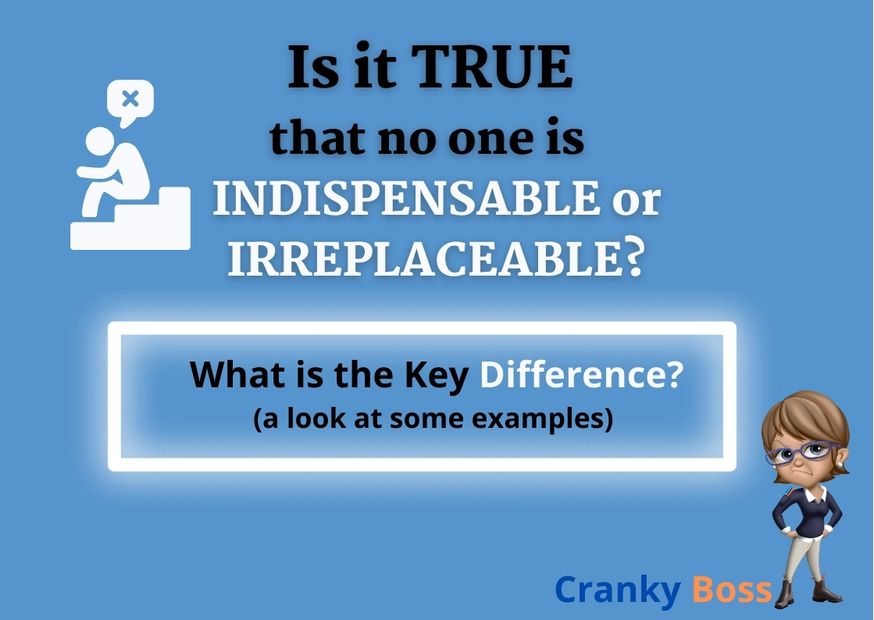The phrase “No one is indispensable” is often heard in workplaces, particularly from business owners and employers when discussing their staff or associates. While it’s a seemingly straightforward statement, it’s one that sparks debate and can carry significant implications for workplace dynamics.

I get a different sort of crankiness when I hear statements like these thrown around without much thought. Perhaps it’s that underlying tone that always gets me.
This article explores the concepts of being indispensable versus irreplaceable, their meanings, and the impact these ideas have on businesses, employees, and leadership.
Indispensable vs Irreplaceable
At first glance, the terms indispensable and irreplaceable may seem interchangeable, but they carry distinct meanings. Understanding these differences can provide clarity when evaluating team members or workplace culture.
Indispensable Meaning
Being indispensable means a person is essential to the functioning of a business. Their absence would significantly disrupt operations or even bring certain processes to a halt.
Indispensability often stems from personal qualities such as:
- Soft Skills: Communication, leadership, initiative, problem-solving, and networking are all soft skills.
- Unique knowledge: Specialized skills or expertise that are difficult to replicate.
It’s about more than just performing a job; it’s about adding unique value to the team and the organization.
Irreplaceable Meaning
An irreplaceable person, on the other hand, refers to someone whose departure would cause temporary inconvenience or disruption. Their role requires time, effort, and resources to replace, but it’s not impossible to do so.
Key characteristics of being irreplaceable include:
- Hard skills: Technical abilities specific to a role or task.
- Knowledge hoarding: Keeping systems or processes private to maintain control.
Unlike an indispensable person, an irreplaceable one is tied more to their position than their personal qualities.
The Role of Soft Skills vs. Hard Skills
The distinction between soft and hard skills is vital when defining indispensability:
- Soft skills are personal attributes, such as leadership, emotional intelligence, and adaptability, which influence teamwork and decision-making.
- Hard skills are technical proficiencies, like using specialized software or machinery, that are necessary for specific tasks.
Indispensable employees often possess a blend of both, whereas irreplaceable individuals are usually defined by their hard skills alone.
Building an Indispensable Team
From my experience, indispensable employees stand out not just because of what they do but because of how they do it. These individuals:
- Take initiative and exceed expectations.
- Consistently contribute innovative ideas.
- Act as problem-solvers and facilitators.
- Share knowledge and foster collaboration.
For example, brainstorming methods like the Six Thinking Hats technique often highlight indispensable employees, as they bring creativity and depth to problem-solving.
However, building such a team isn’t without its challenges. It requires trust, smart relationship management, and a long-term investment in team culture.
The Risks of Over-Reliance
Some argue that relying heavily on indispensable employees creates a business risk. If they leave, the organization may face disruptions. While this is a valid concern, the benefits of having indispensable individuals often outweigh the risks when managed wisely.
Practical strategies include:
- Cross-training team members to reduce reliance on one individual.
- Documenting processes to ensure continuity.
- Recognizing and valuing contributions to build loyalty.
Hypothetical Case Study: The Dangers of Mismanagement
Let’s consider a scenario:
Alex and Jane recently bought a business with 10 long-term employees. Within three months, they decided that two key staff members were “not open to change” and let them go, claiming that “no one is indispensable.”
Problem 1: Resignations
Both employees resigned during the peak Christmas season, leaving Alex and Jane scrambling to find replacements during the global Great Resignation. Hiring, onboarding, and training new staff took time and money, and mistakes during this period disrupted operations further.
Problem 2: Snowball Effect
The extra workload caused by the departures overwhelmed the remaining team. This led to the resignation of another staff member, resulting in 30% of the workforce leaving within weeks.
Problem 3: Operational Turmoil
Alex and Jane ended up dividing one role among four people—two inexperienced hires, one existing staff member pulled off their regular duties, and themselves. The inefficiency caused frustration, decreased morale, and further losses.
This case highlights how poor judgment and rigid adherence to clichés like “no one is indispensable” can harm a business.
Is It Good to Be Indispensable?
From an employee’s perspective, being indispensable offers job security and career growth opportunities. For employers, indispensable team members drive success, innovation, and a strong workplace culture.
However, the key lies in balance:
- Employers should focus on retaining indispensable employees by recognizing their value and fostering collaboration.
- Employees should aim to be indispensable by building a mix of hard and soft skills.
Conclusion: A Balanced Approach
The statement “No one is indispensable” is often used as a way for employers to assert control, but it can reflect a deeper weakness: an over-reliance on key staff without a backup plan.
Saying “everyone is replaceable” in a work setting is just as problematic as saying“the customer is always right”. It’s an overused phrase that often comes from a place of insecurity and weakness. It lacks thoughtful consideration and doesn’t reflect reality.
While technically anyone can be replaced, the cost of doing so—financially and culturally—can be significant. Businesses should focus on building strong, collaborative teams and creating an environment where indispensable contributions are valued and nurtured.
Ultimately, success in any workplace comes from compromise, cooperation, and a shared commitment to growth.

